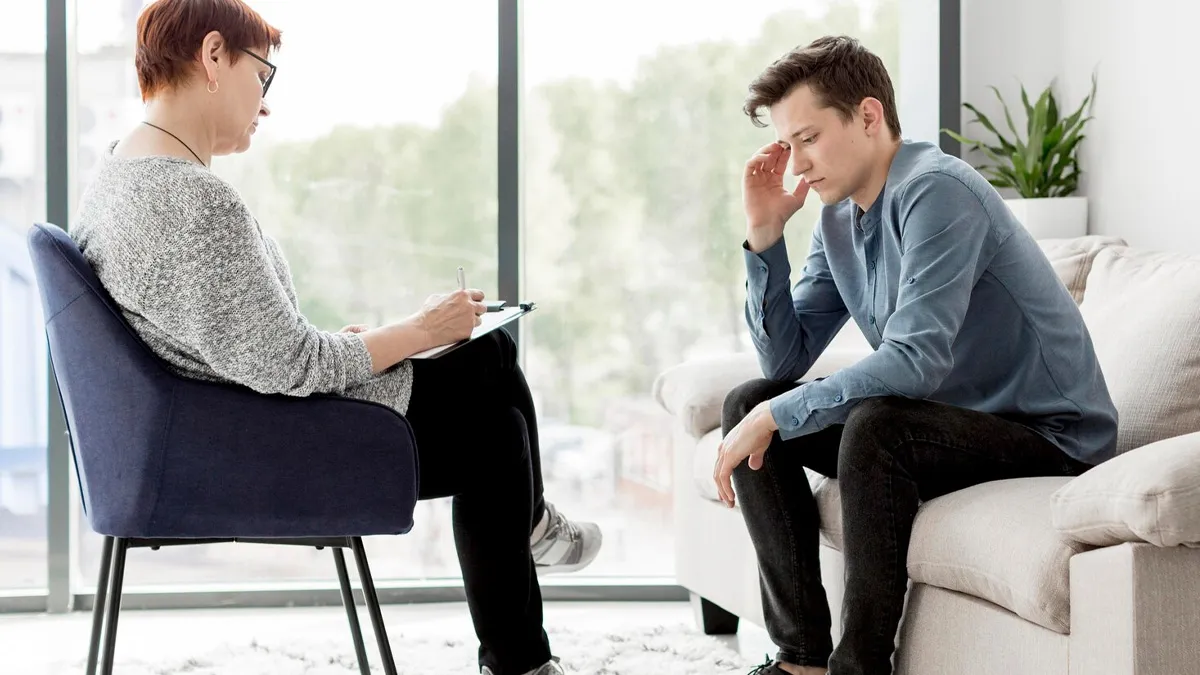
You must have heard about phrases like ‘men don’t cry’ and ‘man up’. These phrases have one aspect in common: they are a way of telling men to suppress their emotions. We are in 2025, and even today, taboos and stigma around men seeking help for their mental health issues exist. Not only the stigma, but the existing gender roles and how men process their emotions, these too play a major role in why they are reluctant to seek therapy when in need.
Table of Content:-
CHECK YOUR
MENTAL HEALTH

To get a better understanding on this topic, we reached out to Dr Madhurima Mondal (Consultant Psychiatrist, MBBS MD and DNB Psychiatry, MR Bangur Hospital, West Bengal). Read to know more.
Men Process Emotions Differently
According to India's National Crime Records Bureau (NCRB), the suicide rate is significantly higher for men than for women. A 2025 ekincare report on corporate India found that women are nearly three times more likely than men to seek mental health support. This makes us wonder: why the mental health gap? Well, to get to the root of it, let’s start with the fact that men and women process their emotions differently.
Mental health issues in men are difficult to spot. When they start experiencing symptoms of depression or anxiety, they are likely to try and fix them externally. They might look outward for a solution.
“Substance use disorder, especially alcohol use disorder (AUD), is more prevalent in male,” says Mondal. When dealing with feelings of sorrow or unease, people often act out in different ways. Some may seek alcoholism, substance abuse, workaholism, or even an increase in romantic partners. These are believed to be some of the common ways to deal with feelings.
Symptoms Of Mental Health Issues In Men
Another fact is men and women even experience symptoms of mental disorders and conditions differently. Some common symptoms of mental health issues in men include:
- Anger, irritability, or aggressiveness.
- Noticeable changes in mood, energy level, or appetite.
- Difficulty sleeping or sleeping too much.
- Difficulty concentrating, feeling restless, or on edge.
- Increased worry or feeling stressed.
- Misuse of alcohol, drugs, or both.
- Persistent sadness or feelings of hopelessness.
- Feeling flat or having trouble feeling positive emotions.
- Engaging in high-risk activities.
- Aches, headaches, or digestive problems without a clear cause.
- Obsessive thinking or compulsive behavior.
- Thoughts or behaviors that interfere with work, family, or social life.
- Thoughts of death or suicide or suicide attempts.
Why Men Hesitate To Seek Therapy
“Mental health is still a taboo among men in India. Very few with mental health issues seek professional help.The stigma is more in the rural population than urban and in conservative settings. According to the National mental health survey (2015-2016), mental health morbidity is higher among males than females. Unreported depression is commonly seen in males,” shares Dr Mondal.
Furthering shedding light on how men can be more vocal about their mental health needs, the expert suggests the following:
- Encourage men to share their feelings and emotions.
- Start open conversations with them about work stress and issues in personal life.
- Men need to seek professional help if suffering from anxiety, depression or any other psychiatric illness.
- There is a need for increased awareness at the community level (both rural and urban) via campaigns, health camps, social media awareness.
- There is a need to psychoeducate the general population about mental health.
Let’s take a look at some other lifestyle and self-help approaches:
- Relaxation techniques.
- Breathing exercises.
- Mindfulness and meditation.
- Exercise regularly.
- Follow a balanced and nutritious diet.
- Get sufficient sleep.
- Find meaning in life.
- Spend time with family and friends.
The Final Word
Men process emotions differently than women. The societal stigma and existing gender roles also pose barriers for men to openly talk about their mental health issues. An increased awareness at the community level is needed to address this. Men need to make an effort to share their feelings, and they need encouragement from others as well to do so.
Also watch this video
FAQ
Why is men's mental health such an issue?
Men are far less likely than women to seek treatment for issues such as depression, substance abuse, and stressful life events.Why are men's emotions ignored?
Men are supposed to be strong and emotionally resilient, but these persistent ideals have shaped expectations placed upon men for too long.How do gender roles affect men's mental health?
Generally, traditional masculinity norms prevent men from seeking help for psychological problems.
How we keep this article up to date:
We work with experts and keep a close eye on the latest in health and wellness. Whenever there is a new research or helpful information, we update our articles with accurate and useful advice.
Current Version
Oct 10, 2025 13:08 IST
Published By : Shruti Das